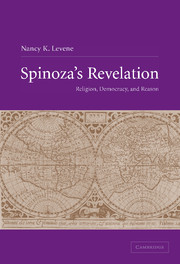Book contents
- Frontmatter
- Contents
- Preface
- Acknowledgments
- List of abbreviations
- Introduction
- 1 Vera religio
- 2 Spinoza's Bible: Concerning how it is that “Scripture, insofar as it contains the word of God, has come down to us uncorrupted”
- 3 Politics, law, and the multitude
- 4 Reason, revelation, and the case of the Hebrews
- Conclusion
- Bibliography
- Index
1 - Vera religio
Published online by Cambridge University Press: 22 September 2009
- Frontmatter
- Contents
- Preface
- Acknowledgments
- List of abbreviations
- Introduction
- 1 Vera religio
- 2 Spinoza's Bible: Concerning how it is that “Scripture, insofar as it contains the word of God, has come down to us uncorrupted”
- 3 Politics, law, and the multitude
- 4 Reason, revelation, and the case of the Hebrews
- Conclusion
- Bibliography
- Index
Summary
Whatever we desire and do of which we are the cause insofar as we have the idea of God, or insofar as we know God, I relate to Religion.
(E IV p37s)Just as men are accustomed to call divine the kind of knowledge that surpasses human understanding, so they call divine, or the work of God, any work [opus] whose cause is generally unknown. For the common people [vulgus] suppose that God's power and providence are most clearly displayed when some unusual event occurs in Nature contrary to their habitual beliefs [opinionem] concerning Nature, particularly if such an event is to their profit or advantage.
(TTP, 72)Superstition
Spinoza uses the term true or universal religion, vera religio, in the TTP to distinguish between those precepts that teach “the divine law revealed to all mankind through the Prophets and the Apostles” (TTP, 6) and the teachings of sectarians that “preach only such novel and striking doctrine as might gain the applause of the crowd” (TTP, 4). He distinguishes, in other words, between true and false religion, between religion and superstition, between what is truly divine and what is merely a “relic of man's ancient bondage” (TTP, 3), between the divine light that produces equanimity and fellowship and the “arrogant ravings” that produce strife and persecution (TTP, 5).
- Type
- Chapter
- Information
- Spinoza's RevelationReligion, Democracy, and Reason, pp. 16 - 76Publisher: Cambridge University PressPrint publication year: 2004



